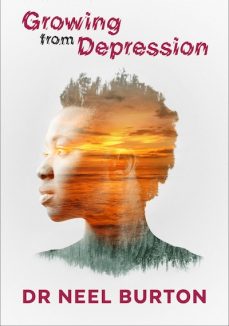By Dr. Neel Burton, Psychiatrist at Oxford University
Most people think of depression as a mental disorder, that is, a biological illness of the brain. Here I argue that the concept of depression as a mental disorder has been unhelpfully overextended to include all manner of human suffering, and, more controversially, that ‘depression’ can even be good for us—an idea that I first visited in my book The Meaning of Madness.
Many of the most creative and insightful people in society suffer or suffered from depression or a state that may have been diagnosed as depression. They include the politicians Winston Churchill and Abraham Lincoln; the poets Emily Dickinson, Sylvia Plath, and Rainer Maria Rilke; the thinkers William James, Isaac Newton, Friedrich Nietzsche, and Arthur Schopenhauer; and the writers Charles Dickens, William Faulkner, Graham Greene, Leo Tolstoy, and Tennessee Williams, among many others.
Let us begin by thinking very broadly about the concept of depression. In traditional societies human distress is more likely to be seen as an indicator of the need to address important life problems rather than as a mental disorder requiring professional treatment, and for this reason the diagnosis of depression is correspondingly less common.
In modern societies such as the UK and the USA, people talk about depression more readily and more easily. As a result, they are more likely to interpret their distress in terms of depression, and also more likely to seek out a diagnosis of the illness. At the same time, groups with vested interests such as pharmaceutical companies and mental health experts promote the notion of saccharine happiness as a natural, default state, and of human distress as a mental disorder.
The concept of depression as a mental disorder may be useful for the more severe and intractable cases treated by hospital psychiatrists, but probably not for the majority of cases, which, for the most part, are mild and short-lived and easily interpreted in terms of life circumstances, human nature, or the human condition.
RELATED: FDA Grants ‘Breakthrough’ Status to Psilocybin Mushroom Therapy for Untreatable Depression
Another (non-mutually exclusive) explanation for the important geographical variations in the prevalence of depression may lie in the nature of modern societies, which have become increasingly individualistic and divorced from traditional values. For many people living in our society, life can seem both suffocating and far removed, lonely even and especially among the multitudes, and not only meaningless but absurd. By encoding their distress in terms of a mental disorder, our society may be subtly implying that the problem lies not with itself but with them, fragile and failing individuals that they are. Of course, many people prefer to buy into this reductive, physicalist explanation than, presumably, to confront their existential angst. But thinking of unhappiness in terms of an illness or chemical imbalance can be counterproductive, as it can prevent us from identifying and addressing the important psychological or life problems that are at the root of our distress.
All this is not to say that the concept of depression as a mental disorder is bogus, but only that the diagnosis of depression has been over-extended to include far more than just depression the mental disorder. If, like the majority of medical conditions, depression could be defined and diagnosed according to its pathology—that is, according to its physical cause or effect, or an objective criterion such as a blood test or a brain scan—such a state of affairs could not have arisen. For this reason especially, the concept of depression as a mental disorder has been charged with being little more than a socially constructed dustbin for all manner of human suffering.
ALSO: How a Yoga Teacher is Saving First Responders Across America From Depression – With Downward Dog
Depression, in fact, may be conferring an important adaptive advantage for the human species.
What important adaptive advantage could the depressive position be conferring? Just as physical pain has evolved to signal injury and to prevent further injury, so the depressive position may have evolved to remove us from distressing, damaging, or futile situations. The time and space and solitude that the adoption of the depressive position affords prevents us from making rash decisions, enables us to see the bigger picture, and—in the context of being a social animal—to reassess our social relationships, think about those who are significant to us, and relate to them more meaningfully and with greater compassion. In other words, the depressive position may have evolved as a signal that something is seriously wrong and needs working through and changing or, at least, processing and understanding.
Sometimes we can become so immersed in the humdrum of our everyday lives that we no longer have time to think and feel about ourselves, and so lose sight of our bigger picture. The adoption of the depressive position can force us to cast off the Polyannish optimism and rose-tinted spectacles that shield us from reality, stand back at a distance, re-evaluate and prioritize our needs, and formulate a modest but realistic plan for fulfilling them.
Although the adoption of the depressive position can serve such a mundane purpose, it can also enable us to develop a more refined perspective and deeper understanding of ourselves, of our lives, and of life in general. From an existential standpoint, the adoption of the depressive position obliges us to become aware of our mortality and freedom, and challenges us to exercise the latter within the framework of the former. By meeting this difficult challenge, we are able to break out of the mold that has been imposed upon us, discover who we truly are, and, in so doing, begin to give deep meaning to our lives. To quote Marcel Proust, who himself suffered from depression, ‘Happiness is good for the body, but it is grief which develops the strengths of the mind.’
CHECK OUT: What It’s Like For a Woman With Depression to Build an Upbeat Multi-Million Dollar Company
You see, people in the depressive position are often stigmatized as ‘failures’ or ‘losers’. Of course, nothing could be further from the truth. If these people are in the depressive position, it is most probably because they have tried too hard or taken on too much—so hard and so much that they have made themselves ‘ill with depression’.
In other words, if these people are in the depressive position, it is because their world was simply not good enough for them. They wanted more, they wanted better, and they wanted different, not just for themselves, but for all those around them.
So if they are failures or losers, this is only because they set the bar far too high. They could have swept everything under the carpet and pretended, as many people do, that all is for the best in the best of possible worlds. But unlike many people, they had the honesty and the strength to admit that something was amiss, that something was not quite right. So rather than being failures or losers, they are just the opposite: they are ambitious, they are truthful, and they are courageous. And that is precisely why they got ‘ill’.
To make them believe that they are suffering from some chemical imbalance in the brain and that their recovery depends solely or even mostly on popping pills is to do them a great disfavor.
It denies them the precious opportunity not only to identify and address important life problems, but also to develop a deeper and more refined appreciation of themselves and the world around them—and therefore to deny them the opportunity to fulfill their highest potential as human beings.
 Dr. Neel Burton is author of Growing from Depression, The Meaning of Madness, and other books. Excerpts reprinted with permission, original article can be read in full at Psychology Today.
Dr. Neel Burton is author of Growing from Depression, The Meaning of Madness, and other books. Excerpts reprinted with permission, original article can be read in full at Psychology Today.
(Featured photo by bandita, CC license)
SHARE the Empowering Essay with Friends on Social Media…




















